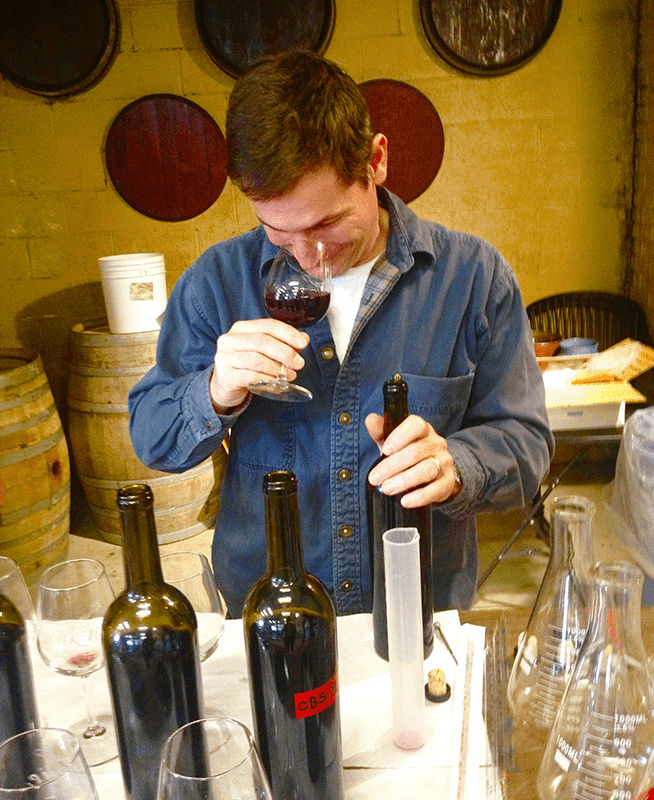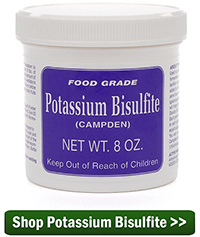 I have a 2017 Chamborcin that has a smell like acetone is their a way to remove this taste. Will oak aging help? If I let it oxygenate for several hours it is palatable. What can I do? I feel I have done every step correctly and my Vidal Blanc taste great a very light dry. Why does this wine smell like acetone?
I have a 2017 Chamborcin that has a smell like acetone is their a way to remove this taste. Will oak aging help? If I let it oxygenate for several hours it is palatable. What can I do? I feel I have done every step correctly and my Vidal Blanc taste great a very light dry. Why does this wine smell like acetone?
Charlie C. — GA
—–
Hello Charlie,
When you say your wine smells like acetone, two things instantly come to mind:
- It could be from fermenting the wine at too warm of a temperature. If a fermentation becomes too hot the yeast become stressed causing all types of funny chemical-like aromas. This is the reason we recommend that a wine fermentation never go over 75°F. and to take some sort of action to cool the fermentation if it does.
- It could be that your wine is turning to vinegar. This typically happens when your wine has been contaminated with acetobacter (vinegar bacteria). The acetobacter could have come from anywhere. It could have been on the grapes, your equipment… If you’re making wine in a root cellar it could be floating around in the air and on the walls. The tell-tale sign of a vinegar fermentation going on in your wine is the smell of finger nail polish remover (ethyl acetate), which as a smell very similar to acetone.
Either situation is not a good one to be in, but it would be helpful to know the specific reason why your wine smells like acetone before moving forward:
- If you noticed the acetone smell in your wine during the fermentation, then most likely it is from a hot fermentation. The odor will become noticeable along with all the other smells of a fermentation. Then as time goes on, and the wine is racked a couple of times, sulfited, etc. you will notice the chemical smell start to become less noticeable.

- If you did not notice it during the fermentation, but noticed the acetone smell later on and getting worse with time, then it is most like that your wine has caught the vinegar bug. Even if you did smell it during the fermentation, but it has gotten worse since then, I would lean towards acetobacter as being the cause – the overriding factor is: it’s getting worse, not better.
What To Do Now
- If you feel that that your wine smells like acetone because it was fermented too hot, then I would do nothing other than go through your normal winemaking procedures. The strategy is to hope that the smell is volatile enough to dissipate on its own accord. If it becomes time to bottle the wine and the aroma of acetone is still noticeable, about the only thing you can do is rack the wine in a splashing manner and then sulfite. The type of sulfite you use does not matter. It can be Campden tablets, potassium metabisulfite or sodium metabisulfite. Use the dosage that is recommend on the contain it came in. The splashing will encourage the acetone smell to dissipate. The sulfites will help to drive out the odor as well as any oxygen that may have saturated into the wine during the process. Excessive oxygen in the wine can lead to oxidation.
- If it seems as though your wine smells like acetone because of acetobacter, then there is something you can do now to stop it from getting any worse: that is to sulfite the wine. Any of the sulfites mentioned above will easily destroy the vinegar bacteria that is growing in your wine and producing this odor. This will stop things from getting any worse, however it will not reverse the damage that has already been done. To rid the wine of the smell that is already there, you will have to do as recommended before. That is to splash the wine and treat with sulfites. Unfortunately, in many cases of acetobacter contamination, this is not enough and the wine is lost.

What To Do With Future Batches
There are things you can do to make sure your future batches of wine do not smell like acetone:
- Keep the fermentation temperatures from rising too high: Do the best you can to keep your fermentation around 70° to 75°F. Fermentations create their own heat, so it might be advisable for you to get a liquid thermometer of some type to track the fermentation temperature.
- Use sulfites at the appropriate times: The wine should be treated with sulfites 24 hours before the yeast is added, then again before aging, then once more before bottling.
- Keep air exposure to a minimum: Not only does air promote oxidation, it also promotes of growth of an acetobacter. Getting a few cells of vinegar bacteria in your wine is not a problem. It’s when those few cells are given the opportunity to reproduce and grow into a full-blown colony. That’s’ when your wine can start to smell like acetone. This is what excess air exposure does.
- Make sure your wine making equipment is sanitary: Just as keeping your wine sanitary with sulfite, it is important to sanitize all your wine making equipment. First make sure it is soapy clean, then sanitize it with a product such a Basic A Cleanser.
- Make sure your wine making area is sanitary: If you are making wine in a basement or cellar, you may need to sanitize your entire wine making area. This can be done with spray bottle filled with a mixture of 1/4 cup of Clorox bleach to 1 gallon of water. Do not spray your equipment with this mixture, but rather counter-tops, exposed floor joists, etc.
Charlie, I hope this information helps you out. Having a wine smell like acetone is a good reason for concern. Hopefully, everything will work at fine and you will finish with a wine that will be well beyond your expectations.
Best Wishes,
Ed Kraus
—–
Ed Kraus is a 3rd generation home brewer/winemaker and has been an owner of E. C. Kraus since 1999. He has been helping individuals make better wine and beer for over 25 years.

I’ve read a couple of your posts before, and this one particularly has been very helpful. Thank you so much for this. I have a whole barrel of wine thats smelling like nail polish, and was feeling very low thinking I’d need to flush it down the drain. Will surely try your solutions. I can’t thank you enough for this post.
Hi Ed,
I had this happen to my 30gallon batch of ameritage blend a couple years ago.
I haven’t used the barrel since and burned one sulfur stick in it so far. My question is,
is this barrel safe to use for future reds? I would hate to get rid of it as it’s only about 4-5 years old.
Thank You
Jane, unfortunately if the barrel was infected with the bacteria that causes vinegar formation, we would not recommend using it again. The chances of being able to get rid of the bacteria in an oak barrel are very slim.
Thanks reading was very helpful in my future wine making
This happened to my 2 gallon batch of Strawberry wine. It is in the beginning stage. It already tastes like vinegar so I think it is too late. I probably did let it ferment too hot. My state is very hot most the year. It is hard to prevent it. It tastes very strawberry. I wonder if there is anything wrong with using it as a strawberry vinegar. I can see this being used for salad dressing and sauces.